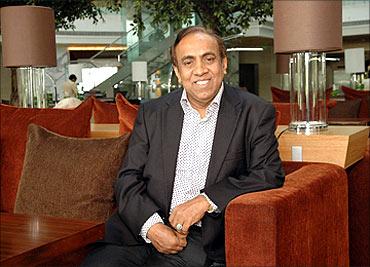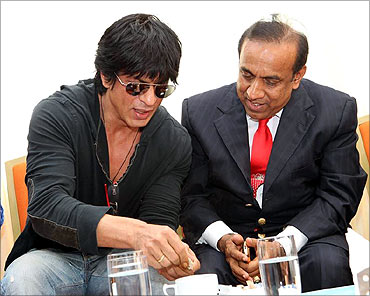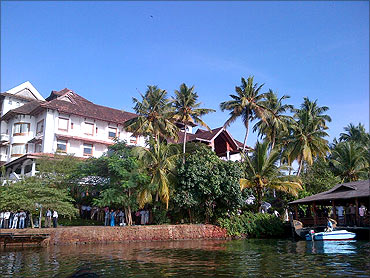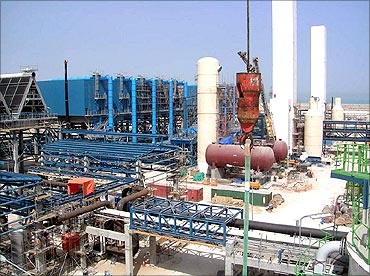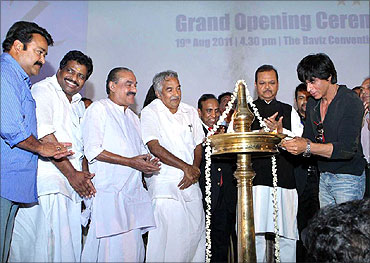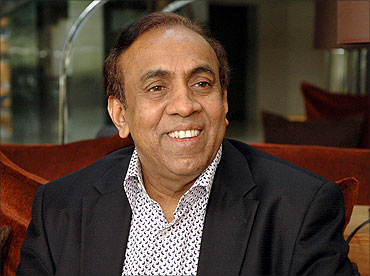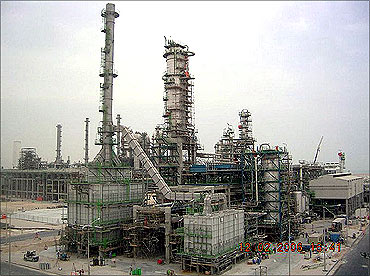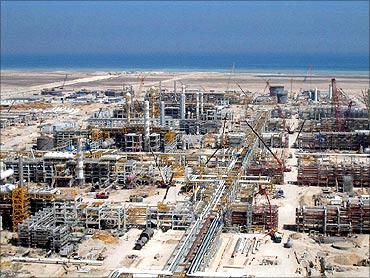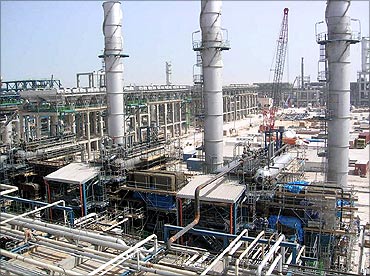 | « Back to article | Print this article |
Ravi Pillai: Amazing journey of the 'Ambani of the Gulf'
Ravi Pillai, is the founder-managing director of the Bahrain-based construction services major Naseer S Al Hajri Corporation (NSH), and Petrochem, Saudi Arabia.
With 60,000 people working for him, he is the largest employer of Indians in the Middle East. His company has a turnover of $2.5 billion.
He is also the recipient of the Padma Shri and the Pravasi Bharatiya Samman.
He spoke exclusively to rediff.com when he was in Chennai for a business acquisition, before flying back to Bahrain.
Click NEXT to read on . . .
Ravi Pillai: Amazing journey of 'Ambani of the Gulf'
Student entrepreneur days in Kollam in Kerala
I am from a farming community from near Kollam in Kerala. When I was young I found that though we farmed, at the end of the year there was no money at home.
Seeing that, I decided that I would be an entrepreneur and provide jobs to others. And I did become one while I was doing my degree studies in college.
I started a chit fund with Rs 100,000, borrowed at local rate of interest. I could make Rs 15-20,000 as profit every month. But I didn't use the money to splurge or enjoy; I re-invested it in my company.
After my graduation, I joined MBA, attending evening classes. I didn't want to go for regular classes as I wanted to concentrate on my business.
I came to know then that construction business was booming in Kerala. So I decided to start a construction company that did sub-contract work.
I hired engineers and other workers to do the work, and I got work at FACT and Cochin Refineries but the largest business came from Velloor Hindustan Newsprint factory. I made 15-20 per cent profit in the work.
But soon the locals in the area went on a strike and stopped work as they thought we were outsiders who had come to snatch their work.
I stopped everything and decided to go to the Gulf.
Click NEXT to read on . . .
Ravi Pillai: Amazing journey of 'Ambani of the Gulf'
Moving from Kerala to the Middle East to do business
Till then, I used to proclaim that only fools went to the Gulf and the intelligent worked here. Some of my well wishers felt I had the ability to work in a foreign land and make a success of it.
The strike was the turning point. I wound up all my business and decided to try my luck in the Gulf.
It was not a sudden decision; I feel that in business, you should never take sudden decisions. A lot of thought has to go in before taking any decision.
In Saudi Arabia in 1978
In 1978, I packed my bags and reached Al Khobar in Saudi Arabia. Was I nervous? I am a firm believer in God and I also was confident that I had a concrete business idea in mind. But I didn't know a single person there, and it was my first visit to a foreign land.
You have to have a local partner with 50 per cent stake in the company to start a business in the Gulf. I got one local person but the entire investment was mine. The business understanding is not legal there; it's only verbal.
You can imagine how tense I must have been in investing all the money that I had without any proper deal. For the first and last time in my life, I taped the conversation I had with my local partner. I was very, very nervous.
Click NEXT to read on . . .
Ravi Pillai: Amazing journey of 'Ambani of the Gulf'
Starting own company in Saudi Arabia and recruiting 150 people from Nagercoil
Through one Swaminathan from the United States, I started trading also. If we bought goods worth Rs 10,000, we could sell them at Rs 50,000 to the US Navy. Through trading, I could make $5-10 million in two years which I could use as capital for my construction company.
With Rs 10 lakh (Rs 1 million), I started my company -- Nasser S. Al-Hajri Corporation (NSH) with 150 people. I recruited all of them from Nagercoil in Tamil Nadu, which is very near Trivandrum. I recruited engineers, semi-skilled and unskilled workers -- all from that area.
The first break was the construction of underground parking for airplanes for a French company. The next big work was the work at the Royal Terminal for $50 million.
Terrific growth after starting refinery and petroleum projects
I would say our real growth started by 1983 after we started doing refinery and petroleum projects. Anyone can be in the construction business, so there is not much profit in it. . . but you need expertise in petroleum projects.
At that time, in the Middle East, most of the petroleum and refinery projects were undertaken by Korean companies.
What we did was, we employed a Korean in our company and that was how we got entry into the projects. In no time, we got sub contracts from them.
We were growing 100 per cent every year then. Within three years, that is, by the early 1980s, I had 4,000-5,000 employees working for me.
Click NEXT to read on . . .
Ravi Pillai: Amazing journey of 'Ambani of the Gulf'
You need trust from people to grow
Because of the kind of work we were doing, companies from Canada, the United States and Saudi Arabia also started calling us. We did not need to go in search of work, it came in search of us.
What you need is, trust from people. After that, you need hard work and then commitment. Once you commit a date for a project worth $10-15 million, you have to abide by that fully. Not a day more.
Our growth has been exponential after year 2000, and that is because oil prices are shooting up from then on.
Employs 60,000 people in the Gulf
Today, after three decades, I employ 60,000 people in the Middle East alone. I have my people working in Saudi Arabia, Qatar, Abu Dhabi, Dubai and Kuwait.
Out of the 60,000 employees, 75 per cent are Indians. We also have people from the Philippines, Nepal, Japan, America, South Africa, etc. I employ more Indians because I am an Indian.
Click NEXT to read on . . .
Ravi Pillai: Amazing journey of 'Ambani of the Gulf'
How good are Indians as workers
In the 1980s, many in the Middle East associated Indians with houseboys and drivers. I can proudly say that I showed them that we had enough skilled and highly skilled people from India.
Once, when we were to do a project for an Italian company, the company guy said, 'I don't think you Indians can do it. Please bring Filipinos.' The work at the first gas liquefaction project required highly skilled fitters, riggers and welders.
Taking it up as a challenge, we did the work solely with Indians, I must say they were mighty impressed. After that, many companies started asking for Indians alone.
Investing in Kerala
It is true that industrialists are scared to invest in Kerala. I thought let me try and see whether it will work or not. I purchased Hotel Leela in Kovalam and opened a world-class 7 star hotel -- Hotel Raviz -- in Kollam.
I have Hotel Kadavu, a 5-star hotel in Kozhikode and one more hotel is coming up in Kozhikode itself. I have also purchased a few shopping malls in Kerala.
If I succeed, many more people will come and invest in Kerala. So far, I have not experienced any problem.
I am sure there will be a change in the industrial atmosphere in Kerala. How has China been perceived till now? Today, it is one of the most investor-friendly countries in the world.
Click NEXT to read on . . .
Ravi Pillai: Amazing journey of 'Ambani of the Gulf'
About the title 'Ambani of the Gulf'
I do not know how to react to this title. What is more important to me is the fact that because of me, so many people live well. For one Indian who works in the Gulf, at least 10 lives are dependent on him.
Almost all my employees have been with me for the last 10-20 years. My original recruits from Nagercoil had not studied beyond the tenth standard, but their children are engineers and doctors today. I feel so happy that I could make a change in their lives.
Because of me, in the Gulf alone, 75,000 people have food. I give free food three times a day to my employees.
Excellent economic situation in the Middle East
The world may be reeling under economic recession but we don't feel that in the Gulf. We have so much work that there is a shortage of labour.
Click NEXT to read on . . .
Ravi Pillai: Amazing journey of 'Ambani of the Gulf'
We require 5,000 more people every month but we are not getting enough man power. You know very well that there is shortage of labour in Kerala and workers in Kerala are from West Bengal and Bihar. Salary has increased by 30-40 per cent in the Middle East also.
As the oil price has shot up, there is a boom in the entire Gulf region as more and more oil explorations are taking place.
Refineries are being opened in the entire Middle East region. So, there is a need for plenty of workers but there is a huge shortage of labour from India.
About the rumour that people are coming back from the Gulf
There is a rumour all over Kerala that there is gloom in the Middle East and people are coming back. It is not true. It is the other way around. There is more work and we have no labour.
For the next five years, this boom will continue. Our own company has been growing tremendously and is expected to grow at 20-30 per cent in the next five years too.
Click NEXT to read on . . .
Ravi Pillai: Amazing journey of 'Ambani of the Gulf'
Economic situation after five years
Though I am not sure how the economic situation would be after five years in the Middle East, I have a feeling there will be a downturn.
Since Europe and the USA are not expected to come out of the recession so soon, usage of petroleum also will come down. Naturally, that will have an impact in the places where oil is explored.
Business expansion
I am not restricting myself to the Middle East or Kerala. I plan to invest in more places in India and other parts of the world. But my core sector will always be petro-chemicals.
I have started a plant in Hong Kong. I have been approached by an Indian company to work in the petroleum and refinery sector. I might start work in India next year.
Click NEXT to read on . . .
Ravi Pillai: Amazing journey of 'Ambani of the Gulf'
Next 5-6 years will change the world
The next 5-6 years are crucial. Unless we invest carefully, we will suffer. The most developed European countries and the US are in a bad economic situation now. How they come out of the recession in the next 5 years is very important.
In the case of the Middle East, problems are there in Libya, Egypt, etc. That is why I have a feeling that the global economic recession will continue for another 5 years.
What is being done today is like giving oxygen to a sick patient. So the result is temporary.
World order will change soon
Manpower is what will decide who the superpower is. That is why China and India hold the key hereafter. Almost 20-30 per cent of the population in Europe lives on pensions. Only 25-30 per cent people are working. As the world is growing old and there is a shortage of manpower in the developed countries.
Only countries like China and India are young. So, these countries will grow the fastest and they will dominate the world order soon. I see China becoming the superpower very soon, overtaking America.
